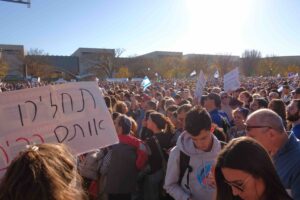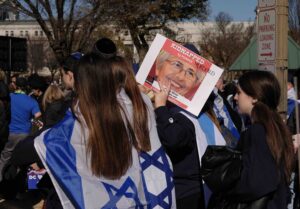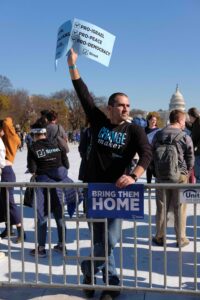For Joel Schindler, showing up for Israel has been a part of his life since June 1967, when he attended a rally for Israel at Lafayette Park in Washington D.C.
“So now it’s 56 years later, and we still are going to these kinds of rallies to support Israel in its right to exist in the Middle East,” said Schindler.
On Tuesday, Schindler made his third trip to D.C. to stand up for the Jewish people, having attended rallies for Soviet Jewry in 1987 and in 2002 to support Israel during the Second Intifada.
On November 14, an estimated 290,000 Jews and allies gathered on a Tuesday in Washington, D.C., for a “March for Israel” to show support for Israelis amid the country’s war with Hamas, call for the release of hostages held by Hamas in Gaza, and protest skyrocketing global antisemitism in the wake of the war.
“I was taken aback with joy when I saw how many people really showed up…and I know many more that would have come if they could have,” said Miriam Bird, a sophomore at the University of Cincinnati. “It was insane and amazing seeing so many people unite.”

A woman raises a sign calling to free Hamas hostages with the Capitol building in the background (Lev Gringauz/Cincy Jewfolk)
“It was like Jewish geography Central,” said Elliot Draznin. “Everyone was seeing people they hadn’t seen in years, and there was so much hugging.”
The Jewish Federation of Cincinnati quickly organized four buses and a charter flight for the over 450 community members who attended the rally in Washington.
“It was like going back to overnight camp on the bus ride and then doing activities and Hebrew songs and all of that,” said Schindler.
Every community, it seems, made clear where they came from: Jews from Texas had their state flag on sweaters, and various posters had “[name of community] stands with Israel” written on them. Jewish humor was also on display, with widespread joking about the event being called a march – but not actually including any marching.
Meanwhile, 12,000 students came from Jewish day schools, throngs of college students wore matching sweatshirts, and Chabad rabbis looking to get Jewish men to put on tefillin had a field day speeding up the coming of the messiah with countless asks and wraps.
“It’s one of the funniest things: everyone from Cincinnati was wearing these highlighter yellow shirts, so if you look at any pictures from any news stations, you can spot who’s from Cincinnati,” said Draznin.
The rally, considered the largest gathering in American Jewish history, brought together a wide-variety of Jews in common cause and grief, but also, in pride for Israel and the Jewish people. Amid chants of “bring them home” and “am Israel chai (the people of Israel live),” the rally had a cathartic – at times even joyful and celebratory – feel.
“There were a lot of different groups there,” said Draznin. “I was not expecting quite the big tent, there was everyone from die-hard supporters of Israel, all the way to folks who were pretty critical, who believed in the idea of Israel but wanted it to be better.”
For participants, there was a sense of catharsis after the rally, which eased – if only for a moment – the deep sense of isolation many Jews feel in their pain about the events in Israel and Gaza.
“I spent a year volunteering with Magen David Adom, and studying in Israel with Young Judea, it was the best year of my life,” said Bird. “I wanted to show up and be present for the country that had given me my best memories, and show my support for the people who have lost loved ones, and the hostages.”
The “March for Israel” was organized by the Jewish Federations of North America and the Conference of Presidents of Major American Jewish Organizations to “make sure the world doesn’t forget” about antisemitism, JFNA’s president and CEO Eric Fingerhut told The Jerusalem Post before the event.
For Fingerhut, it was also about taking a public stand in support of Israel despite widespread anti-Israel sentiment, which has terrified Jews on college campuses and their families, and led to increased security concerns in Jewish communities.
“We think it’s really important to stand up and say that we will not be intimidated,” Fingerhut said. “America is not an antisemitic nation, and we won’t let it become one.”

An estimated 290,000 people came to the “March for Israel,” making it the largest American Jewish rally in history (Lev Gringauz/Cincy Jewfolk)
Speakers at the rally spanned cultural figures like Broadway star Tovah Feldshuh; to renowned activists like Soviet-Jewish human rights activist Natan Sharansky; a long list of U.S. officials like the U.S. special envoy to combat antisemitism Amb. Deborah Lipstadt, Democratic and Republican leaders of the House and Senate, and co-chairs of a bipartisan task force combating antisemitism; and families of the hostages held by Hamas.
“The pain I have experienced since they were taken has been so sharp it follows my every breath,” said Alana Zeitchik, a cousin of six Israelis taken hostage by Hamas.
Zeitchik, wearing six pins on her jacket with the faces of her cousins, told how the family, mostly children, were sheltering from the Hamas attack in a bomb shelter on Kibbutz Nir Oz. Once it was too filled with smoke to be safe – Hamas purposefully set fire to homes and shelter areas to drive people out of safe rooms – one of the cousins sent a voice note to the family group chat, saying simply, “We’re not going to make it out of this. We love you.”
“I promised I would scream to the ends of the earth for them,” Zeitchik said. “This unwavering love of family is the heart of what it means to be Jewish.”
She spoke against people who don’t want to sympathize with the hostages and their families, like activists who have been tearing down posters raising awareness of the hostages across the U.S.
“The simple human truth is that you don’t have to choose: You can abhor the suffering of Palestinian families and the suffering of Israeli families like mine,” Zeitchik said. “You can call for peace and the immediate return of the innocent men, women and children who were violently taken from us.”
Rachel Goldberg, the mother of hostage Hersh Goldberg-Polin, raged against the world’s seeming inability to get the hostages back home from the Gaza tunnels where they are held.

“Kidnapped” signs for Vivian Silver, an Israeli-Canadian peace activist, changed to “murdered” after her body was identified recently. (Photo by Lev Gringauz/Cincy Jewfolk)
“The real souls suffering are those of the hostages, and they want to ask everyone in the world…The indignant, the haters, the leaders, the lovers, every single one of us: Why? Why is the world accepting that 240 human beings from almost 30 countries have been stolen and buried alive?” she said.
Goldberg confronted the rally audience as complicit in that failure.
“There was a Christian German who hid Jews during the Holocaust, and he was asked why he did such a heroic and dangerous act. His answer was simple – ‘At least I will know when I die and stand before God, he will not ask me what he asked Cain in the Bible: Where were you when your brother’s blood cried out from the ground?’” Goldberg said.
“What the world needs to start thinking about today is: What will your excuse be?”
Small details spoke large stories at the rally: A photo of 74-year-old Vivian Silver, an Israeli-Canadian peace activist presumed for weeks to be a hostage, was everywhere on posters. But only days ago, her body was identified out of the rubble of her Kibbutz Be’eri home – she had been killed on Oct. 7.

A man stands in the rally’s “peace bloc” with JStreet signs, while the section is still filling up with people before the start of the rally (Lev Gringauz/Cincy Jewfolk)
One student at the rally crossed out the word “kidnapped” on her poster of Silver and wrote, in marker, the word “murdered.”
Another face on the posters, 19-year-old Israel Defense Forces soldier Noa Marciano, was taken hostage by Hamas. But on Monday, Hamas published a gruesome video that showed a forced interview with Marciano intercut with video of her dead body. Israel confirmed her death.
Notably, at a time when some Jewish leaders are disavowing leftist Jews for their criticism of Israel and participation in pro-Palestinian protests, there was a “peace bloc” of the D.C. Israel rally, which included organizations like Americans for Peace Now, JStreet, the National Council of Jewish Women, and T’ruah.
“The ability to stand together [was important], to find common ground and be able to say yes we all believe in [Israel’s right to exist],” Draznin said.“Now we can talk about it with nuance, now we can talk about how we differ and hopefully make a more constructive and equitable response as a city.”

